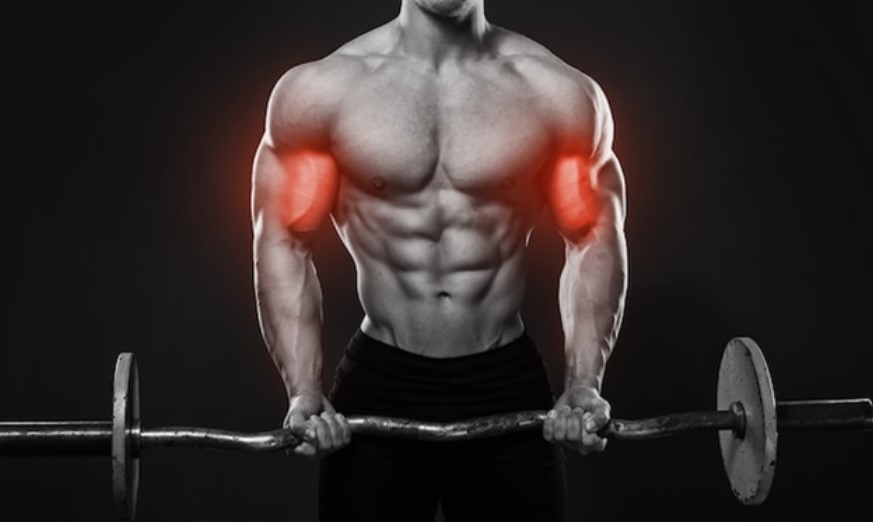Are you tired of feeling sore and achy after a workout? Muscle recovery is an essential part of any fitness routine. Without proper recovery, your muscles can become damaged, leading to pain and decreased performance.
In this blog, we will discuss the best foods and supplements for faster muscle healing. We’ll also cover different types of massage therapy and yoga poses that aid in muscle recovery. Additionally, we’ll talk about the role of stretching in muscle recovery and when to seek medical attention for muscle recovery issues.
Whether you’re a professional athlete or just starting with your fitness journey, this article will provide valuable insights on how to optimize your muscle recovery process for maximum results.
What is Muscle Recovery?
Muscle recovery is the process of rebuilding muscle tissue following a period of exertion. During a tough workout, you might push a muscle group to the point of muscular failure (when you feel physically unable to do another repetition). This process temporarily damages muscle fibers, but during your body’s post-exercise muscle recovery process, the muscle tissue recovers and becomes stronger than it was before, allowing you to build muscle.
What Causes Muscle Soreness?
Muscle soreness is caused by microscopic damage to the muscles during exercise, leading to inflammation, pain, and stiffness. DOMS usually appears 24-48 hours after a workout. Adequate nutrition, hydration, and rest can help alleviate muscle soreness.

Recovery Time After Cycling
After an intense cycling session, recovery time plays a crucial role in faster muscle healing. Microscopic tears occur in the muscle fibers during the physical activity leading to DOMS typically a day or two later. Proper rest, nutrition, and hydration play a vital role in reducing the recovery period. Incorporating active recovery activities such as foam rolling or stretching helps with improved blood flow and range of motion. Massage therapy or compression garments are beneficial in reducing inflammation caused by muscle soreness. Following these tips will assist with faster recovery times and getting back to your next workout sooner.
The Best Nutrition for Muscle Recovery
Here are some of the best foods for muscle recovery:
- Protein: Protein is essential for muscle repair and growth. Good sources of protein include meat, poultry, fish, eggs, dairy products, beans, and lentils.
- Carbohydrates: Carbohydrates provide energy for your muscles. Good sources of carbohydrates include whole grains, fruits, and vegetables.
- Water: Staying hydrated is important for overall health and can also help to reduce muscle soreness. Aim to drink plenty of fluids throughout the day, especially after exercise.
- Fruits and vegetables: Fruits and vegetables are packed with vitamins, minerals, and antioxidants that can help to boost your immune system and protect your cells from damage.
- Healthy fats: Healthy fats, such as those found in avocados, nuts, and seeds, can help to reduce inflammation and improve muscle function.
In addition to eating a healthy diet, there are other things you can do to promote muscle recovery, such as:
- Getting enough sleep: Sleep is essential for muscle repair and growth. Aim for 7-8 hours of sleep each night.
- Foam rolling: Foam rolling can help to reduce muscle soreness and improve flexibility.
- Stretching: Stretching can help to improve range of motion and reduce muscle soreness.
- Massage: Massage can help to reduce muscle tension and improve circulation.
By following these tips, you can help your muscles recover quickly and get back to your workouts feeling your best.
Here are some specific foods that are good for muscle recovery:
- Salmon: Salmon is a good source of protein and omega-3 fatty acids, which are beneficial for muscle health.
- Eggs: Eggs are a good source of protein and choline, which is important for muscle function.
- Greek yogurt: Greek yogurt is a good source of protein and calcium, which are both important for muscle health.
- Sweet potatoes: Sweet potatoes are a good source of carbohydrates and beta-carotene, which is converted to vitamin A in the body. Vitamin A is important for muscle growth and repair.
- Bananas: Bananas are a good source of carbohydrates and potassium, which are both important for muscle health.
You can also try making a smoothie with some of these ingredients to get a quick and easy post-workout meal. Just blend together your favorite fruits, vegetables, protein powder, and yogurt.

Techniques for Muscle Recovery
Muscle recovery is a crucial aspect of any fitness routine or athletic training. Proper recovery techniques help repair muscle tissues, reduce soreness, and optimize performance. Here are some of the best techniques for muscle recovery:
- Rest and Sleep: Getting adequate rest and quality sleep is essential for muscle recovery. During sleep, the body produces growth hormone, which aids in tissue repair. Aim for 7-9 hours of uninterrupted sleep each night.
- Active Recovery: Engage in light physical activity on rest days to promote blood circulation and reduce muscle stiffness. Examples include walking, swimming, or gentle stretching. Avoid intense workouts on recovery days.
- Proper Nutrition: Consume a well-balanced diet with sufficient protein to support muscle repair and growth. Include lean meats, fish, eggs, legumes, and dairy products. Additionally, ensure you’re consuming enough carbohydrates and healthy fats for energy.
- Hydration: Drink an adequate amount of water throughout the day to maintain optimal hydration. Proper hydration supports nutrient delivery to muscles and helps flush out waste products.
- Stretching and Flexibility Exercises: Incorporate stretching exercises into your routine to improve flexibility and relieve muscle tension. Dynamic stretching before a workout and static stretching after can be beneficial.
- Foam Rolling and Self-Massage: Use foam rollers, massage balls, or massage sticks to apply pressure to sore or tight muscles. This helps release muscle knots, increase blood flow, and reduce muscle tension.
- Contrast Therapy: Alternating between hot and cold treatments can help reduce inflammation and improve circulation. For example, take a contrast shower by alternating between hot and cold water for a few minutes.
- Compression Garments: Compression garments, such as sleeves or socks, can enhance blood flow and reduce swelling. They may aid in muscle recovery and reduce muscle soreness.
- Ice Baths or Cold Therapy: Immersion in ice baths or applying ice packs to specific muscle groups can help reduce inflammation and ease muscle soreness. However, avoid applying ice directly to the skin to prevent frostbite.
- Stress Management: High levels of stress can hinder muscle recovery. Incorporate stress management techniques such as meditation, deep breathing exercises, or yoga into your routine.
Remember, everyone’s body is unique, and what works for one person may not work as effectively for another. It’s important to listen to your body, experiment with different techniques, and adjust your recovery strategies accordingly. If you have any specific medical concerns or injuries, consult with a healthcare professional for personalized advice.
Supplements for Faster Muscle Recovery
To accelerate the recovery process of your muscles after a tough workout session or intense physical activity, incorporating supplements in your diet can be beneficial. Protein powder, creatine and BCAAs are some supplements that can provide critical nutrients to aid muscle repair. Additionally, incorporating turmeric or foods rich in Omega-3 fatty acids with anti-inflammatory properties can help reduce post-workout soreness and inflammation. Lastly, staying hydrated with water or electrolyte-rich drinks aids in maintaining blood pressure and flow.
Best Snacks for Post-Workout Muscle Recovery
Here are some of the best snacks for post-workout muscle recovery:
- Greek yogurt with berries: Greek yogurt is a great source of protein, which is essential for muscle repair and growth. Berries are a good source of antioxidants, which can help reduce inflammation.
- Hard-boiled eggs: Hard-boiled eggs are a good source of protein and healthy fats. They are also a portable snack that you can take with you on the go.
- Trail mix: Trail mix is a good source of protein, carbohydrates, and healthy fats. It is a great snack to choose if you are looking for something that will give you sustained energy.
- Smoothie: Smoothies are a great way to get a quick and easy dose of protein, carbohydrates, and other nutrients. You can make your own smoothie or buy one from a store.
- Fruit: Fruit is a good source of carbohydrates, which can help replenish your glycogen stores after a workout. It is also a good source of vitamins and minerals.
- Nuts: Nuts are a good source of protein, healthy fats, and fiber. They are a great snack to choose if you are looking for something that will help you feel full.
It is important to eat a snack within 30 minutes of finishing your workout. This will help your body to recover and repair your muscles. If you are not hungry, you can also have a protein shake or smoothie.

Foods to Avoid After a Workout
Here are some foods to avoid after a workout:
- High-sugar foods: Eating too much sugar after a workout can lead to a spike in blood sugar levels, followed by a crash. This can leave you feeling tired and sluggish. Instead, opt for foods that are low in sugar and high in complex carbohydrates, such as whole grains, fruits, and vegetables.
- High-fat foods: While healthy fats are important for overall health, eating too much fat after a workout can slow down digestion and make it difficult for your body to absorb the nutrients it needs to recover. Instead, choose lean protein sources, such as chicken, fish, or tofu.
- Alcohol: Alcohol dehydrates the body and can interfere with muscle repair. It’s best to avoid alcohol for at least 24 hours after a workout.
- Processed foods: Processed foods are high in unhealthy fats, sugar, and sodium. These foods can contribute to inflammation and make it difficult for your body to recover from a workout. Instead, opt for whole, unprocessed foods that are rich in nutrients.
- Soda: Soda is high in sugar and calories and can contribute to weight gain. It’s also a diuretic, which means it can cause you to lose fluids. Instead, drink water or unsweetened tea or coffee.
How Long Should You Wait to Eat After a Workout?
For muscle recovery and energy replenishment, it’s recommended to eat within an hour after exercise, but up to a few hours is still useful. Protein-rich foods repair muscle while carbohydrates restore glycogen stores. Whey protein or BCAAs can also help if taken appropriately.
Supplements for Optimal Muscle Recovery
Protein supplements like whey, casein, and pea protein are known to repair muscle tissue and aid in post-workout recovery after tough workouts. Similarly, creatine supplements promote muscle strength and endurance during physical activity while reducing muscle soreness during the recovery process. At the same time, Omega-3 fatty acid supplements speed up the recovery process by reducing inflammation and supporting overall health. When selecting a supplement for optimal muscle recovery, always choose reputable brands and follow dosage instructions carefully for best results.
Types of Massage Therapy for Muscle Recovery
- Deep Tissue Massage for Faster Muscle Healing
- Trigger Point Therapy for Muscle Recovery
Best Yoga Poses for Faster Muscle Healing
- Downward Dog Pose to Stretch Muscles
- Cat-Cow Pose to Release Muscle Tension
- Cobra Pose to Strengthen Back Muscles
When to Seek Medical Help for Muscle Recovery Issues?
If you’re dealing with muscle soreness after a tough workout, know that seeking medical attention for muscle recovery is sometimes necessary. If you experience persistent pain or swelling that doesn’t improve with rest or recovery methods, loss of strength or mobility, signs of infection like fever or redness around the affected area, or an injury caused by trauma, then it’s important to consult a doctor. Getting proper diagnosis and treatment can speed up your recovery process and prevent further damage.
Let’s Sum Up
In conclusion, muscle recovery is all about taking care of your body and providing it with the right nutrients, supplements, and techniques to heal faster. From nutrition to stretching and massage therapy, various methods can help you recover from muscle soreness and fatigue. It’s important to understand what works best for your body and make adjustments accordingly. Whether you’re an athlete or someone who enjoys working out regularly, incorporating these tips into your routine can help speed up the healing process and prevent future injuries.
You May Also Like
- The Ultimate Guide to Teen Bodybuilding
- Age is Just a Number: Senior Bodybuilding Tips and Tricks
- 8 Best Bodybuilding Routines to Help You Achieve Your Fitness Goals
- Maximizing Muscle Gains: The Ultimate Guide to Bodybuilding for Men



